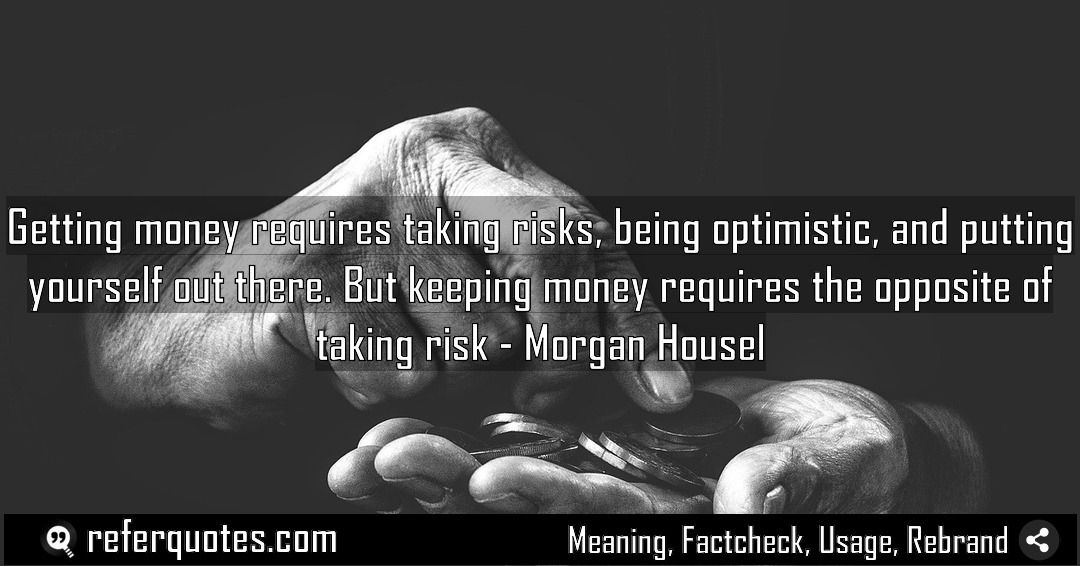
Getting money requires taking risks, being optimistic… but keeping it? That’s a whole different game. It’s about switching from offense to defense, and most people never make that mental shift.
Share Image Quote:
Table of Contents
Meaning
The core message is that the skills needed to acquire wealth are fundamentally different from the skills needed to preserve it. One is about boldness, the other is about caution.
Explanation
Let me break this down for you. Think of building wealth like you’re a startup. You have to be aggressive, you have to swing for the fences, right? That’s the “taking risks, being optimistic” part. You’re in offense mode.
But once you’ve actually built that wealth, the game changes. You’re not a startup anymore; you’re a fortress. And the goal of a fortress isn’t to conquer new land—it’s to protect what’s inside the walls. That requires a completely different mindset. It’s about humility, paranoia, and playing defense. The problem is, most successful people are wired for offense, so they keep swinging for the fences long after they should have started bunting. And that’s how fortunes are lost.
Quote Summary
Reading Level60
Aesthetic Score65
Origin & Factcheck
This insight comes straight from Morgan Housel’s fantastic book, The Psychology of Money, which was published in 2020. It’s a modern classic for a reason. You sometimes see this idea floating around without attribution, but it’s Housel’s unique framing.
Attribution Summary
Where is this quotation located?
| Quotation | Getting money requires taking risks, being optimistic, and putting yourself out there. But keeping money requires the opposite of taking risk |
| Book Details | Publication Year: 2020; ISBN-10: 0857197681; ISBN-13: 978-0857197689; Pages: 256 (approx.) |
| Where is it? | Unknown chapter / page |
Context
In the book, Housel is drilling into this idea that financial success isn’t about what you know, but how you behave. This quote sits in a chapter that’s all about the paradoxes of money—how two opposite things can both be true. He uses stories of people who made fortunes and then lost them to illustrate this critical switch that never happened.
Usage Examples
So, who is this for? Honestly, almost anyone touching money.
- For the ambitious entrepreneur: It’s a reminder that after your exit or IPO, your job description changes from “risk-taker” to “capital preserver.” Don’t bet the company a second time.
- For the young professional: As your salary grows, the biggest risk isn’t missing out on the next hot stock; it’s a single, catastrophic loss. This quote justifies a shift to a more boring, diversified portfolio.
- For anyone who’s had a windfall: An inheritance, a bonus, whatever. This is the mantra. The skill that got you this lump sum is not the skill that will keep it safe for the long term.
To whom it appeals?
Share This Quote Image & Motivate
Motivation Score65
Popularity Score70
Shareability Score65
Common Questions
Question: Does this mean I should never take risks once I have money?
Answer: Not at all. It means the purpose of risk changes. You take small, calculated risks with a tiny portion of your capital, not “bet the farm” risks that could wipe you out. The goal shifts from getting rich to staying rich.
Question: Why is it so hard to make this mental switch?
Answer: Because our egos get tied to the story of how we made the money. We think our genius was in taking that big risk, so we keep doing it. We fail to see that the game has changed, and luck often played a bigger role than we care to admit.
Question: Can you be good at both?
Answer: It’s incredibly rare. That’s why you often see founders hand over the CEO role to a “operator” or why family offices hire conservative wealth managers. It’s an admission that a different skillset is required for the next phase.
Similar Quotes
You know, that idea “Less ego, more wealth” from Morgan Housel is so simple yet so profound. It basically tells us that the flashy stuff we buy to impress others…
“Money comes and goes,” but the real game-changer is understanding its mechanics. That knowledge is what gives you the power to build lasting wealth, not just chase paychecks. Table of…
Few things matter more with money than understanding your own time horizon. It’s about knowing the game you’re playing and not getting distracted by the noise from other people’s completely…
You know, “The only reason any person does not have enough money…” is one of those quotes that either clicks instantly or makes you want to roll your eyes. Having…
You know, the foundation of abundance is not money but mutual trust. It’s one of those ideas that seems obvious once you hear it, but it completely flips our modern…
